By: Rukhsar Jabbar. M.Sc. Physiotherapy. Freelance Health Writer and Datelinehealth Africa (DLHA) volunteer. Medical review and editorial support provided by the DLHA Team
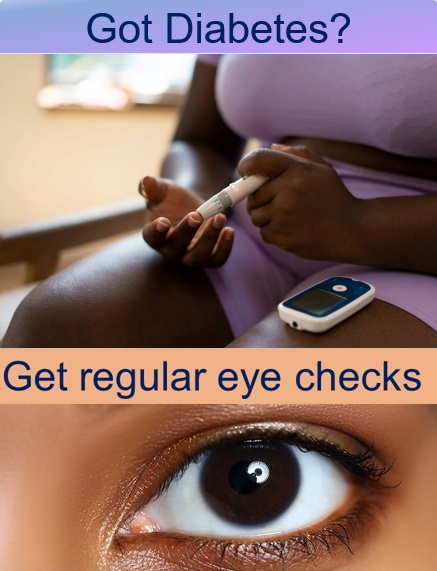
Banner image showing partial view of a black diabetic woman in a purple top and pants, seated and performing a finger prick on a right finger to check her blood sugar level. There is a black and white coloured blood glucose meter on her left thigh. Image of woman by Freepik
Did you know that one of the leading causes of eyesight loss in the world is diabetic eye disorder? The best part is that if you have diabetes, you can protect your eyesight if you take proper care and precautions.
According to estimates from the International Diabetes Federation (IDF, the number of adults in Africa who have diabetes will increase by 232% from 23.6 million in 2021 to 53.9 million in 2045. So diabetic eye conditions can be expected to also increase a lot during the period.
Here are some practical tips you should take up to prevent eyesight loss if you have diabetes:
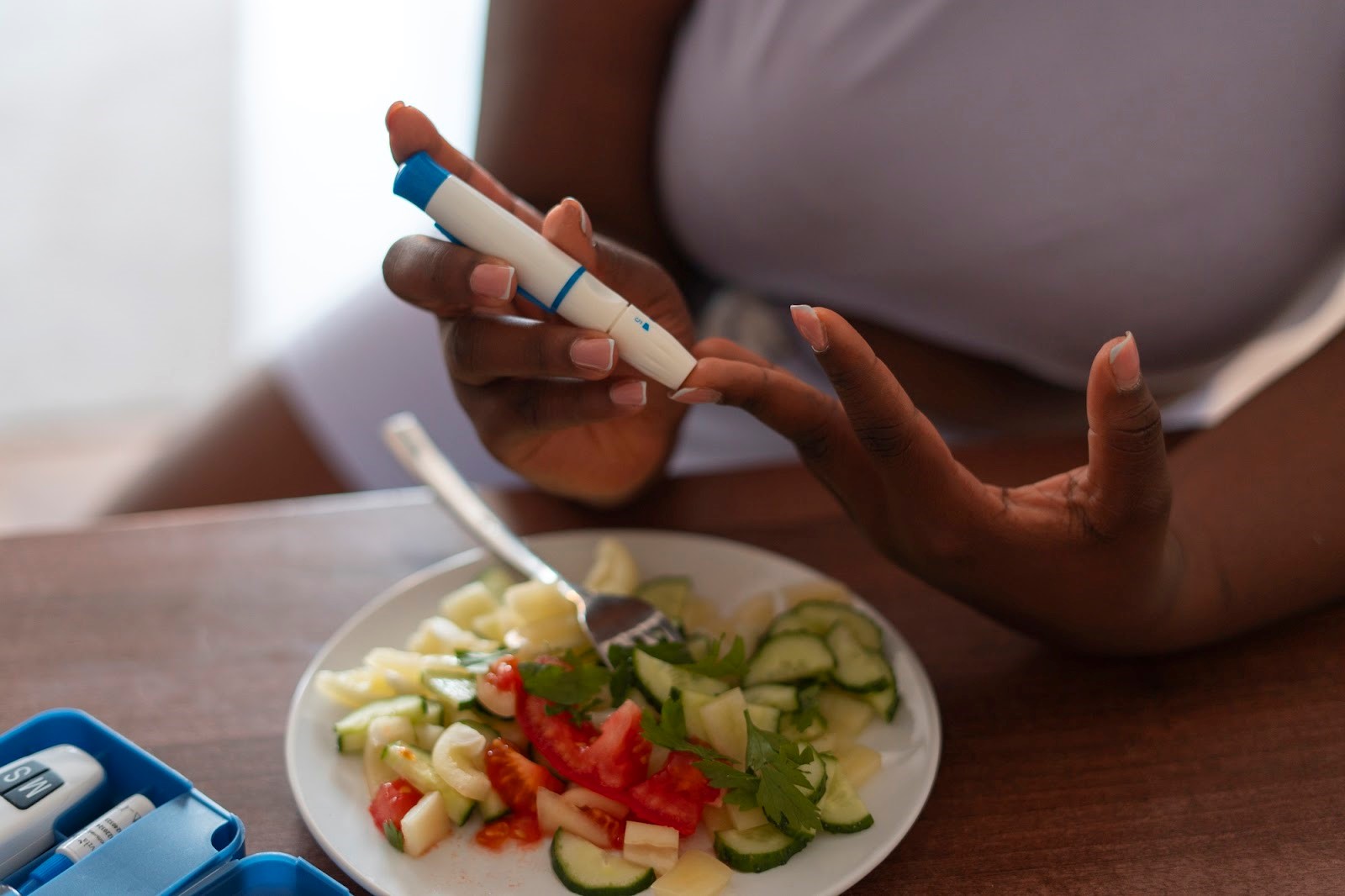
A black woman seated at a table with a plate of vegetable salad and glucose test kit, doing a finger prick to check her blood glucose level. Image by Freepik.
Two of the keys to preventing eyesight loss associated with diabetes is to control blood sugar and blood pressure levels.
Working with your doctor to monitor and keep your average blood sugar and blood pressure levels within target ranges will help prevent damage to the blood vessels in your eyes.
Maintaining a healthy weight, eating a balanced diet, and engaging in regular exercise coupled with medications as needed are beneficial in controlling your blood pressure. [3]

A young African male wearing bright ornage T-shirt and holding a jumping rope tightly across the back of his neck. Image by Freepik
Maintaining a healthy lifestyle not only includes healthy eating but also exercise and weight management. The following are the main ways to have a healthy life.
The components of a meal plan include what you eat, how much you eat, and when you eat it. You may keep your blood pressure, cholesterol, and glucose levels within the ranges recommended by your healthcare providers by eating and drinking healthy. [4]
Sample healthy foods available across Africa. Click on image to enlarge
To eat and drink healthy, do the following:
There are good evidence suggesting that taking supplements like Omega 3 fatty acids, Vit. B6 and B12 may be good for your eyesight if you have diabetes
Regular exercise is necessary for people with diabetes. Regular physical activity can help to control your blood sugar level and also impact your overall well-being. Talk to your healthcare provider before engaging in exercises to identify which are the best fit for you.
Varieties of suitable exercise types for diabetics
The length of your physical activity is one of the variables that will affect how your blood glucose reacts to physical activity. Exercise can lower blood sugar levels for as long as 24 hours after a workout because it makes the body more sensitive to insulin. [4]
To know more about exercise and diabetic care, check here
One benefit for diabetics is being able to maintain a healthy weight. If you have diabetes, you may find it easier to manage your blood sugar levels after reducing weight. You may also need less medication for diabetes. Many people who lose weight say they sleep better and feel more invigorated.
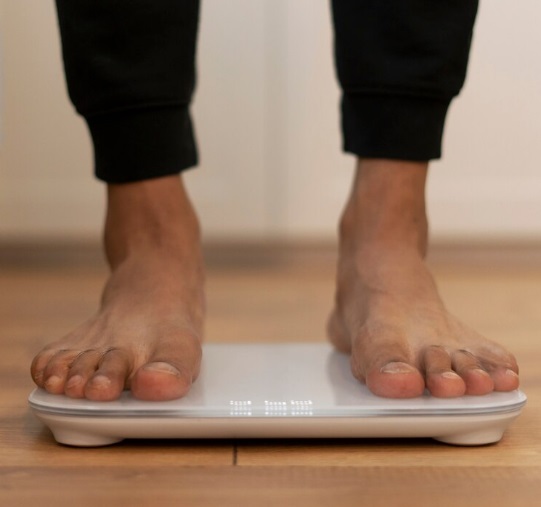
A close up of the feet of a black male on a weighing scale
To lose weight, you don't have to shed a lot of weight. Your health and well-being can benefit from even a 5% to 10% decrease. That is 10 to 20 pounds for a 200-pound person.
Losing weight is a different matter from reaching a healthy weight goal. You should keep your weight within a reasonable range based on your body mass index (BMI). [4]

Stop smoking signage. Credit: Background design by macrovector/ Freepik
Cigarette smokers are 30–40% more likely to develop type 2 diabetes than nonsmokers. Compared to nonsmokers, smokers with diabetes are more likely to have trouble managing their diabetes and administering insulin. The more cigarettes you smoke, the higher your risk of type 2 diabetes is. [5]
You will see instant health benefits from quitting smoking if you have diabetes. Diabetics can better control their blood sugar levels by quitting smoking, [6] but difficult challenges exist that may impede this. [6]
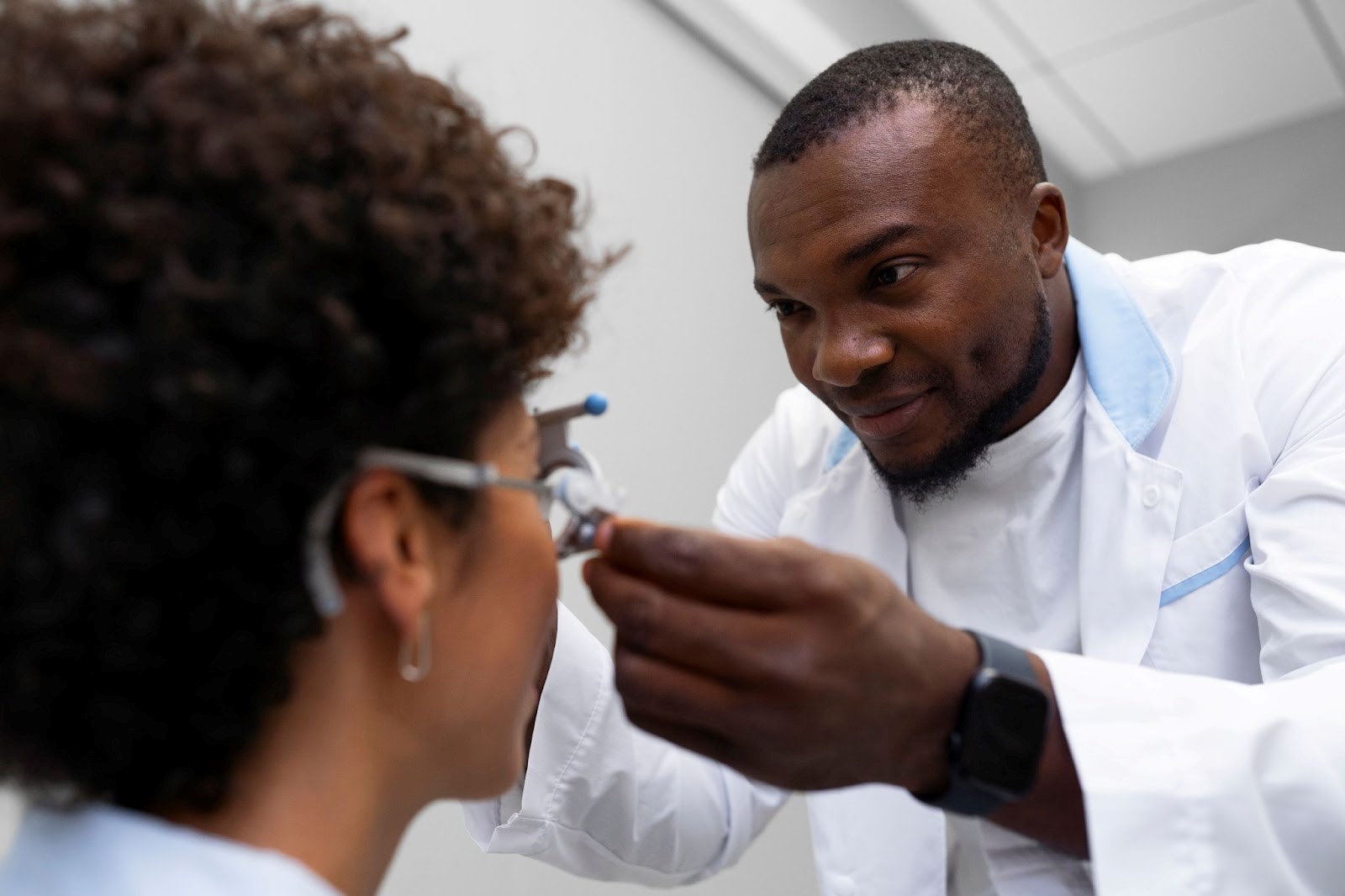
Doctor and patient at an eye screening session for eye glasses. Image by Freepik
Regular checkups of your eyes are necessary if you have diabetes. Some people think they should only get their eyes examined when they start to exhibit symptoms. This is not correct. Irrespective of your blood sugar levels, every diabetic patient should have an eye check once a year at the minimum. [7] More is better. This ensures that any eye problem you may have will get a better shot at management and recovery when detected early.
Info-poster: Warning signs of Diabetic Eye Disease, Click on image to enlarge.
The following are warning signs of eye disease or complications that you need to know as an African with diabetes:
Get checked by your doctor if you have any of these conditions.

A lack lady posing outdoors and wearing sunglasses and a wide-brimmed hat. Image credit: senivpetro/Freepik
Wear sunglasses when outdoors to protect your eyes from harmful UVA and UVB rays from sunlight and any other sources.
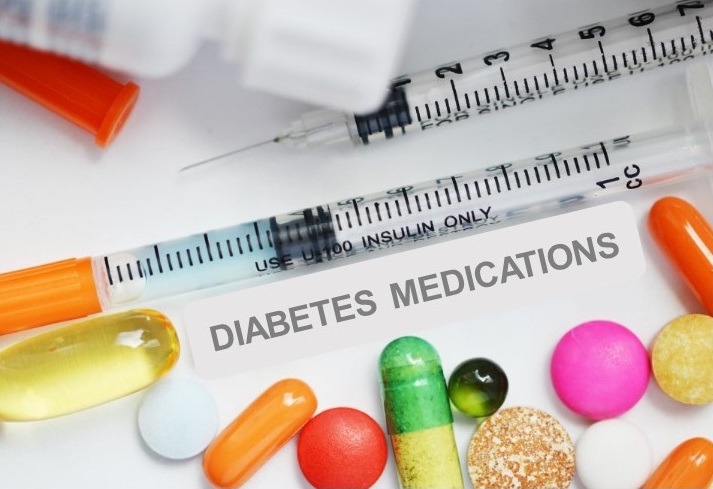
Examples of oral and injetable medications for diabetes.
If your doctor has put you on injectable insulin or oral anti-diabetic medications and or antihypertensive medications, take them as directed and check in regularly with your doctor to monitor if the medications are working well to control to diabetes and prevent complications including eye diseases.
Taking proactive steps to care for your eyes is essential, especially when managing diabetes. By maintaining a healthy lifestyle, controlling blood sugar levels, and scheduling regular eye check-ups, you can significantly reduce the risk of developing serious eye complications. Remember, early detection and timely intervention are key to preserving your eyesight.
Your eyes are a priceless gift—protect them by staying informed and seeking professional advice when needed. Prioritise your eye health today to ensure a brighter, clearer tomorrow. Make eye care an essential part of diabetes management.
1. Burgess PI, MacCormick IJC, Harding SP, Bastawrous A, Beare NAV, Garner P. Epidemiology of diabetic retinopathy and maculopathy in Africa: a systematic review. Diabet Med. 2013 Apr;30(4):399–412. doi: 10.1111/j.1464-5491.2012.03756.x. Available from here.
2. National Eye Institute. Diabetic retinopathy. [Internet]. Last reviewed 2024 Dec. 10. [Cited 2024 Dec 24]. Available from here.
3. American Diabetic Association. Understanding blood glucose and exercise. [Internet, n.d.]. [Cited 2024 Dec 24]. Available from here.
4. CDC. Diabetes. Manage blood sugar. [Internet] 2024 May 15. [Cited 2024 Dec 24].Available from here.
5. Centers for Disease Control and Prevention. Tips from Smokers. Smoking and diabetes. [Internet] Last reviewed 2023 Oct. 13. Cited 2024 Dec 29]. Available from here.
6. World Health Organization. WHO Africa. Diabetes prevention, care challenges in Africa [Internet]. 2021 Nov. 17. [Cited 2024 Dec 31]. Available from here.
7. Alali NM, Albazei A, Alotaibi HM, Almohammadi AM, Alsirhani EK, Alanazi TS, et al. Diabetic retinopathy and eye screening: Diabetic patients standpoint, their practice, and barriers; a cross-sectional study. J Clin Med. 2022 Oct 27;11(21):6351. doi: 10.3390/jcm11216351. Available from here.
Related:
Cataracts in Africa: Symptoms, Diagnosis and Care
10 Common Questions on Cataracts and Their Answers
Tips for Taking Care of Your Vision as You Age
Best African Foods for Eye Health
5 Practical Tips for Good Eye Health
15 Healthy Snacks for African Diabetics
Published: July 17, 2024
© 2025. Datelinehealth Africa Inc. All rights reserved.
Permission is given to copy, use and share content for non-commercial purposes without alteration or modification and subject to source attribution.
DATELINEHEALTH AFRICA INC., is a digital publisher for informational and educational purposes and does not offer personal medical care and advice. If you have a medical problem needing routine or emergency attention, call your doctor or local emergency services immediately, or visit the nearest emergency room or the nearest hospital. You should consult your professional healthcare provider before starting any nutrition, diet, exercise, fitness, medical or wellness program mentioned or referenced in the DatelinehealthAfrica website. Click here for more disclaimer notice.